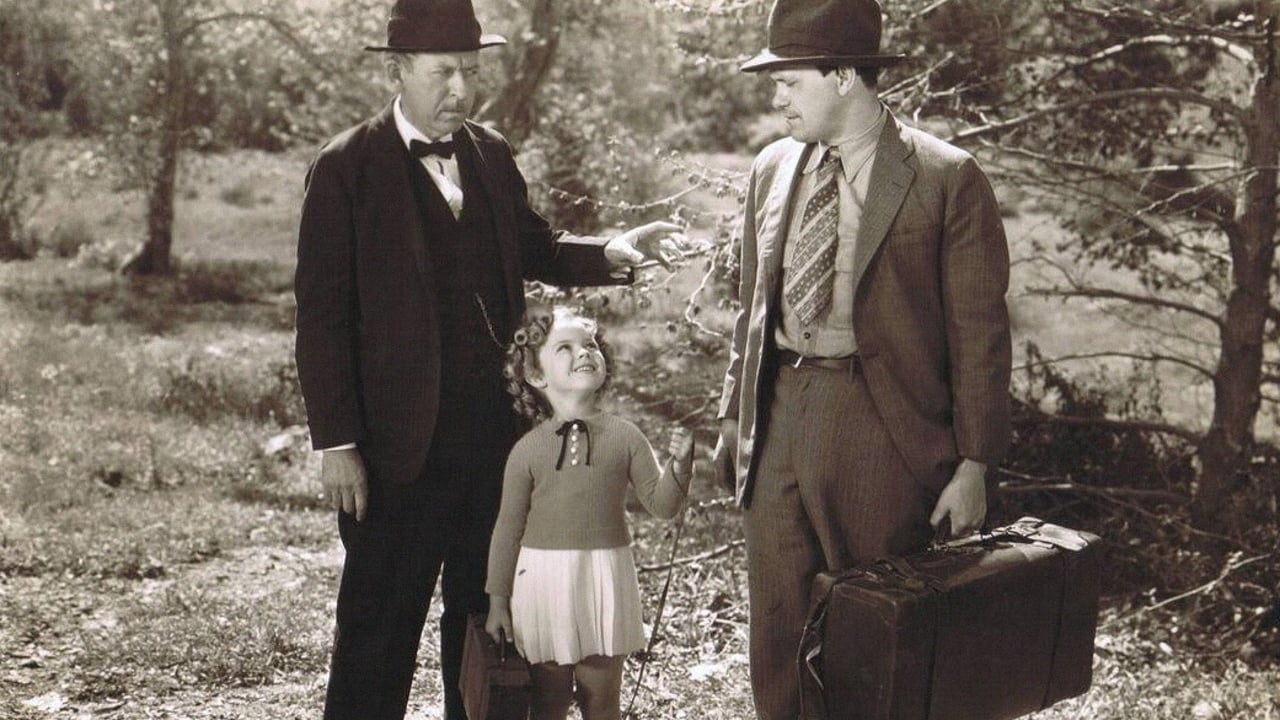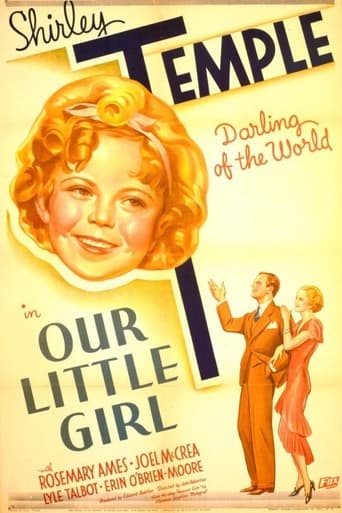

Excellent, smart action film.
... View MoreSimple and well acted, it has tension enough to knot the stomach.
... View MoreWhile it doesn't offer any answers, it both thrills and makes you think.
... View MoreThe story, direction, characters, and writing/dialogue is akin to taking a tranquilizer shot to the neck, but everything else was so well done.
... View MoreHaul out the bathtowels on this one. No parents like Joel McCrea and Rosemary Ames are getting divorced as long as they have an offspring like Shirley Temple to keep them together.Our Little Girl finds America's favorite moppet the daughter of the aforementioned couple. Joel is a research doctor who takes a small country practice to both support his wife and his daughter. But he gets so involved in his experiments he's leaving his wife alone to the attention of his playboy neighbor Lyle Talbot. And he's looking like someone his nurse Erin O'Brien-Moore just might be able to catch on the rebound.The film had a great deal more potential than what we got. It could have been a serious look at divorce through a child's eyes. I think that's what they were trying for at Fox, but the problem was that Shirley's audiences expected things to go a certain way in her films. So Fox gave them the typical Shirley and then some. It was the 'and then some' that doomed this film to a weepy soggy mess.
... View MoreOUR LITTLE GIRL (Fox, 1935), directed by John Robertson, a domestic drama taken from a story "Heaven's Gate," stars Shirley Temple, Joel McCrea and someone by the name of Rosemary Ames (in her final screen appearance following a very brief movie career). Similar in theme to RKO Radio's WEDNESDAY'S CHILD (1934) that revolves around a boy (Frankie Thomas) whose happy home is disrupted by the separation of his parents (Edward Arnold and Karen Morley), OUR LITTLE GIRL centers around the moppet Temple facing the same situation of her own, but without any courtroom or child custody battles, which might have helped quicken the pace or added more interest to a somewhat slow scenario.Set in a small town, the plot introduces the Middletons as a happy family: Donald (Joel McCrea), a respectable doctor; Elsa (Rosemary Ames), his loving wife, and their little girl, Molly (Shirley Temple) who looks forward to their twice a year family picnic each May and September Saturday at a park called Heaven's Gate. Donald works long and hard on his experiments along with his assistant, Sarah Boiton (Erin O'Brien-Moore), a nurse who's secretly in love with him. Because he's away from home too often, Elsa spends much of her lonely hours with Rolfe Brent (Lyle Talbot), her former horse breading beau who recently has moved into town from Europe. Due to Donald's misunderstanding and jealously towards Elsa and Rolfe, the couple argue, leading little Molly to find herself caught in the middle of things, and unable to comprehend why her father will no longer be living with them anymore. After overhearing a conversation between her mother and Rolfe that has her believing that she's the cause for her parent's separation, Molly decides to take matters into her own hands by leaving home.A minor Temple drama with little of the Temple formula intact. Aside from singing a lullaby to her doll and later playing Stephen Foster's "Banjo on My Knee" on the piano, there are no songs nor dance numbers. Considering its theme, song interludes have no precedence in the story, though some slight doses of humor including Temple on the seesaw with her dog, Sniffy, as examples that keep the narrative from becoming strictly melodramatic. Unlike her more recent releases, OUR LITTLE GIRL, is the only one of Temple's leading roles that can be categorized as strictly "B" product, considering it being the shortest (63 minutes) of her starring film roles.Others in the supporting cast consist of Poodles Hannerton as the Circus Performer; Margaret Armstrong (Amy, the Middleton housekeeper); Ruth Owin (Alice) and Leonard Carey (Jackson), each as Brent's servants; and best of all, J. Farrell MacDonald billed as Mr. Tramp, playing a homeless man who comforts little Molly by listening to her story as to why she's leaving home. This little scene is well handled, with some humor in spoken dialog by Shirley thrown in for good measure. Watch for it. OUR LITTLE GIRL became one of many Temple movies to become available on video cassette during the late 1980s and then on DVD in both black and white and colorized formats. Formerly presented on The Disney Channel in the 1980s in colorized version, it then turned up on American Movie Classics as part of its Sunday morning "Kids Classics" (1996-2001), and finally on the Fox Movie Channel in its original black and white format. Bob Dorian, former host of AMC, once commented in his profile about OUR LITTLE GIRL in saying that its working title "Heaven's Gate" had been changed prior to release due to it the name suggesting a cemetery, leaving an indication as being a movie about death.Although OUR LITTLE GIRL didn't turn out as interesting as the rarely seen WEDNESDAY'S CHILD (1934), nor become the Academy Award winner as KRAMER Vs. KRAMER (1979), it's one of those little movies that might have been better had it not been hampered by a weak script. Had it not been for "Our Little Girl" Shirley Temple in the title role keeping the story alive with her know-how performance, then this minor effort of hers would certainly have ended up along with many old Fox Films to be either lost, forgotten or both. (**1/2)
... View MoreEven today, it's doubtful that anyone settling down to a Temple movie will have 'accidentally' stumbled upon it whilst browsing, and knows what they're letting themselves in for. Temple's vehicles are a sub-genre of their own and, in terms of cinematic artistry, are amongst the kind of films who's best critics by far are their own core audience.The plot of OLG seems the kind of mawkish fare that Miss Curly Top was a dab-hand at resolving with a starry smile and a twinkly eye - mum and dad's marriage hits the rocks, divorce beckons following infidelity, and Shirley is of course caught up in the middle of it all.This particular entry somewhat subverts the given formula however, and throughout the film's brief hour-long running time the perspective is in the main unusually dour. Whilst we're not exactly talking 'Requiem For A Dream', there is no sanguine song-and-dance routine to make everything alright here. It takes a runaway Shirley, one of those stock-character post-depression aphoristic hobos, and much wincing solemnity on the part of respected Thesps McCrea and Ames to win the day.Director Robertson apparently chose not to heed WC Fields' advice regarding children and animals, having already directed a version of 'Annie' in 1932, and having to contend with a lot of one and a little of the other here too. One has to wonder whether there was any sadistic pleasure taken in the fabled 'dead animals' factor necessary for Temple's required tears quota, which on this occasion would certainly have been higher than usual.
... View MoreThe issue of divorce and how it affects children is only marginally dealt with in this cloying story of a happy family torn apart by a rotten script. Too much time is spent on the cutesy antics of Shirley Temple, while too little time is devoted to the development of the plot and characters. In this 65-minute programmer, things happen at lightning speed, with little logic or motivation behind them. Thus, the marital split of the two leads comes too suddenly and seems unrealistic. The same can be said about the relationship between the soon-to-be-ex-wife and her wealthy suitor. The adult cast is passable, but Temple is unbearably sugary. Director John S. Robertson, used to handling costume pictures during the silent era, should have realized that less is more when it comes to baby grins and baby pouts. Make sure you check your blood-sugar level after watching this one.
... View More